Last week, I went to New York to pitch a book about transparency, startup struggles, and the last 15 years of Moz’s story to publishers. It wasn’t dissimilar from the VC-pitching process; lots of nervousness, waiting, hoping, and tension. But, midday Wednesday, after meetings on Monday and Tuesday, I received a phone call from my agent, Sylvie, with exciting news. The conversation was something close to this:
Sylvie: I have good news
Rand: OK
Sylvie: Portfolio made a preempt offer.
Rand: I don’t think I know what that means.
Sylvie: It means they’d like to stop an auction from happening with other publishers.
Rand: OK. That sounds like a good thing.
Sylvie: It’s for $– (sadly, I’m not permitted to share the advance amount, but it was a big number) for world rights, which means they want to be able to sell the book globally.
Rand: I’m sorry, I couldn’t quite hear you. Could you… (I realize there’s lots of people around and I don’t want to repeat the number I think I heard out loud)… Could you say the number again?
Sylvie: $–
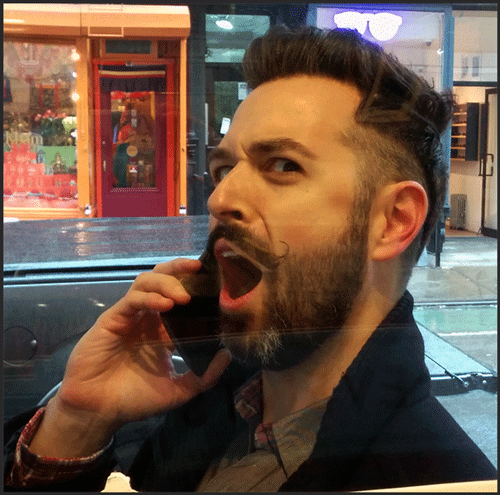
Rand: That sounds really good. (At this point, I’m just trying to hide my excitement and play it cool) What do you think?
Sylvie: I think we should negotiate given that they’d like world rights
Rand: You clearly know what you’re doing – I trust your instincts – go for it.
Sylvie: Great, I’ll talk to them and get back to you before you get on the plane back to Seattle.
I was outside the McNally Jackson bookstore in Nolita. Geraldine, who’d just wandered over from a publisher meeting of her own, came outside at the end of my call. I told her the good news, we freaked out a bit, and wandered around in a daze for 15 minutes before deciding we must be hungry. We celebrated with some Nasi Lemak, one of my favorite dishes, at a Malaysian restaurant nearby before heading to Newark airport. It was a surreal feeling.
Of course, now I have to write a book… But, before I do, I figured I’d tell you all more about the process, the topic, why I decided to write it, and when you can expect to see it. The traditional publishing process was fascinating to learn about, and hopefully my experience can help other curious folks to better understand the intricacies.
Why Write a Book? Why Now?
Over the years, I’ve experimented with many different forms of content – blog posts, guides, videos, graphics, presentations, interviews, podcasts, guest posting, free tools, surveys, etc. My experiences have been consistently positive. Sharing what I learn with people is fundamental to who I am, and it’s deeply rewarding for me. It’s also been a large contributing factor in my professional success.
In addition to those positive experiences, I’ve had some really heartbreaking, frustrating, painful ones in my last couple years as CEO at Moz (before stepping down and turning the reigns over to Sarah). One of the realizations that emerged from reflecting on that time was my strong desire to pursue “individual contributor” work. I love creating things and sharing them with people, and I particularly like when I’m solely responsible for the quality of those creations. There’s something deeply satisfying for me in knowing that the only barrier to the quality of a creation (a blog post, a research project, a visual, a video, a presentation, etc) is the quality of work I do personally. I don’t get to hold anyone else accountable if it fails. The timing can’t be held up by anyone but me. If no one likes or uses it, I deserve all the blame.
A book fit squarely in that model, and while I’m certain the process of writing it will be immensely difficult, I’m also extraordinarily excited to get to make something of this scope on my own (with, of course, help from my publisher and editor).
Why Traditional Publishing?
When I came to the conclusion in May of last year that a book was something I wanted to pursue, I spent an immense amount of time researching the publishing world and trying to understand the benefits and drawbacks of various approaches.
I started with two paths:
- A tweet, which led me to some superb people and resources (you can see many of these in the Twitter replies)
- A number of emails to folks I had some prior contact with who’d written business books I’d loved (like the ones below)
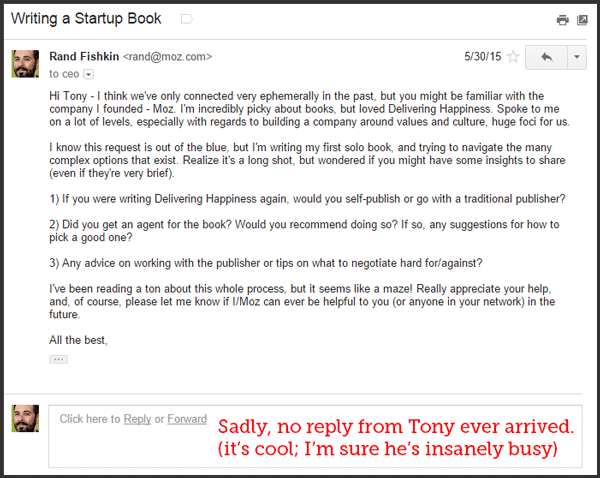
Yeah, Tony didn’t reply, but lots of folks did, including Nir Eyal, author of the remarkable book, Hooked (which I highly recommend):
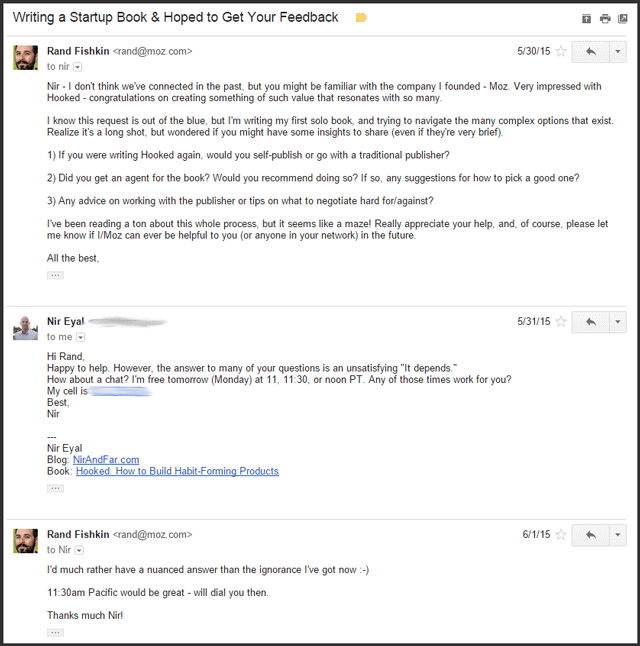
The experience was a lot like my process for raising venture capital. I talked to lots of people who’d done it before, had success, and could share their experiences. I did a paid consultation with Jane Friedman (who wrote this superb starter guide on how to get published). I had a call with Seth Godin, who’s far too kind to me (way more than I deserve). I talked to Tim Ferris, whose “How to Write a Bestselling Book” post was invaluable.
And, finally, I talked to Eric Ries, whose Lean Startup is renowned as a bible for folks like me in the startup world. It was Eric who introduced me to the agent I’d eventually sign with, Sylvie Greenberg from Fletcher and Co.
The reason I chose to pursue a traditional publisher rather than self-publishing, using Kickstarter, or going with one of the many alternative publishing options had to do with my primary goal. The vast majority of the advice I received from authors and those knowledgeable about the publishing world was this:
- If my goal was to maximize my personal profit, self-publishing (or one of the creative alternatives) was almost certainly the right way to do it.
- If my goal was to reach new audiences I and Moz couldn’t/didn’t already reach, and experiment with the brand impacts that a “book in a bookstore” might have, traditional publishing was the right path.
The second of these was my aim. While profit would certainly be desirable, I have a nice paycheck from Moz and pretty low living expenses (Geraldine and I still rent the same apartment we’ve lived in for 5 years, I still have never owned a car and walk to work, we cook at home most nights, and we return most of the shoes we buy from Zappos).
What I really hope to get with this book is insight into a completely different world of content, promotion, marketing, and sales, and to learn if/how a traditional book can influence people. I felt I couldn’t do that as effectively without a traditional publisher, and thus, pursued that option.
What Did the Book Deal Process Entail?
Thanks to Eric’s introduction, and Sylvie’s interest in me as an author, I found a path forward. It is next to impossible to reach traditional publishers without a book agent (as I learned in my conversations), and agents who’ve previously represented successful authors in your space are what everyone suggested I look for. Sylvie fit the criteria perfectly, and we hit it off over the phone, on email, and in person when I met her in August in New York.
The next 6 months were interesting. The process went something like this:
- Craft a book proposal – a peculiar document that’s very specific to the publishing world and follows a number of historically-established protocols that took me a long time to get used to. I’ve made a copy of my proposal (with a few elements edited/removed) public on the web, so anyone can check it out. The final proposal was nearly 30 pages and took months of back-and-forth work between me and Sylvie.
- Write the first chapter – as part of the proposal, it’s traditional to send in the first chapter or two. My first stab, after substantive editing with Sylvie and a kind review from Geraldine and Wil, was ~8,500 words and told my story of dropping out of school, facing near-bankruptcy, hiding debt from my Dad, and the first inkling that the SEOmoz blog might be a way out of financial ruin.
- Schedule a trip to New York – nearly all of the major publishers in the United States have their physical offices in Manhattan, and we determined that in-person meetings would be good for both parties. Sylvie noted that these meetings can be done remotely, over the phone, too.
- Send the proposal to publishers – only a week before I arrived in New York, Sylvie sent out my proposal to a list of folks she has asked me to keep private. Even the weekend before the Monday & Tuesday of meetings, I didn’t know what my schedule would look like!
- Meet with publishers in person – on Monday and Tuesday of last week, I sat down with folks and talked about the book. It was a really fun process, and I had a particularly strong connection with the team from Portfolio (they even have an editor – Eric Nelson – who uses Followerwonk to check out potential authors’ Twitter profiles; how cool is that?!).
- Run an auction – the plan Sylvie described to me was to ask all the interested publishers to send in bids, and then choose one or negotiate from there. However, Portfolio made what Sylvie called a “preemptive offer” on Wednesday morning, before any process started, and both Sylvie and I agreed that it was a great match and offer, so I flew home to Seattle that night with a publisher!
This last week, I’ve had the privilege of working with my new editor at Portfolio, Niki Papadopoulos, who, over the last seven days, has been a wonderful combination of tough, supportive, and encouraging. You can see her first email to me below:
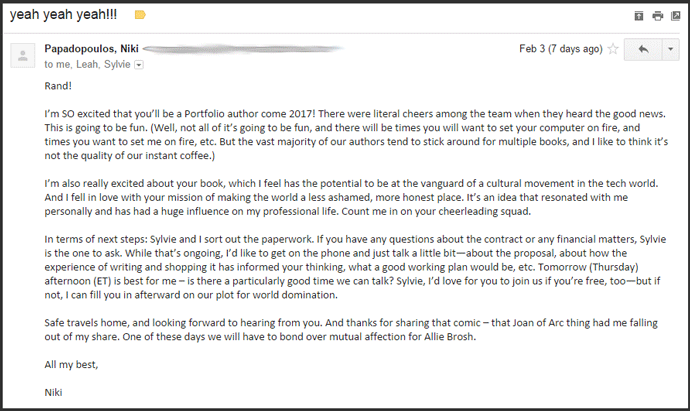
I think together, we’re going to make a great team 🙂
Why Does the Size of Advance Matter?
Advances are a funny thing. I’m sorry I can’t share the amount of mine – Sylvie said that and the precise details of which publishers I met with and who was interested (or wasn’t) needed to be kept under wraps. What I can say is that optimizing for a big advance initially struck me as nonsensical.
To my early thinking, a big advance seemed like a poor move for a publisher, because they were placing a risky bet on an as-yet-unproven commodity. It also seemed that, for an author, a large advance suggested insecurity in their ability to sell the book and earn royalties based on the quantity sold. But, over time and conversations with folks familiar with the industry, the idea of an advance made more sense.
Big advances indicate books (and authors) that the publisher believes in, and whose work they want. Since profits are hard to come by in traditional publishing, there’s not much wiggle room on royalty rates (in fact, Sylvie said they’re pretty much non-negotiable). Advances, therefore, are how publishers bid on deals (much like how VCs use company valuation). The books that earn large advances tend to also earn the most marketing and promotion effort from a publisher – book placement, press, paid advertising, etc. Thus, for an author, even one who isn’t terribly interested in or worried about the financial side, a big advance is an indication and implicit promise of marketing the publisher plans to invest.
If you’re interested in more detail about advances, I suggest checking out this NYTimes piece on the subject.
What’s the Book About? What Will Be Included?
Well, you could always read the book proposal I made available 🙂 Kidding!
In brief, my book is about three things:
- Transparency in business, and how it guided and powered Moz’s growth, management, and marketing.
- The story of Moz’s startup journey, our struggles through a wide variety of challenges (from fundraising to hiring to turning down an acquisition offer to product mistakes to CEO transition and more), and a set of actionable tips and takeaways based on our experiences across every facet of building a business.
- Data and insight from a large-scale survey of other startup founders helping to illustrate common challenges, mistakes, and practices. I’ll be running this survey soon, and including comparisons of Moz vs. the dataset of other companies in the book (and possibly some elements on this blog, too).
On our first call together, Niki asked me to send her answers to a number of questions about my vision for the book, including what would be a “minimum” book and what could help make it “extraordinary.” I pasted my answer to that below:
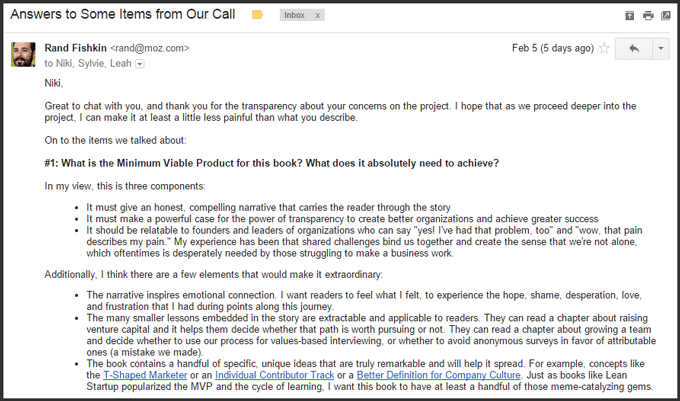
This is going to be a hard book to write, and an even harder book to write well. But, in a way that is totally unlike my normal, neurotic, nebbishy, low-self-esteem self, I’m feeling up for it. I kinda can’t wait 🙂
When Will It Be Available?
Sometime in 2017, probably between June-November. Books take time to write, to edit, and to market, and 18-24 months to publication isn’t unusual once a book deal gets done. While I’d love to snap my fingers and make it happen tomorrow, I want to give this work everything I’ve got (and everything Portfolio does, too). I also hope that being able to include the recent SaaS downturn and how Moz responds in 2016 will make the book even better and more relevant.
If you have topics you’ve always been curious about as they relate to Moz and to startup struggles and growth, please don’t hesitate to leave a comment and let me know. I’m insanely passionate about producing a book that’s as transparent and helpful as possible.
p.s. A huge thanks to my agent, Sylvie Greenberg, and to my new editor, Niki Papadopoulus, for all that they’ve done and all they will being putting up with from me.
